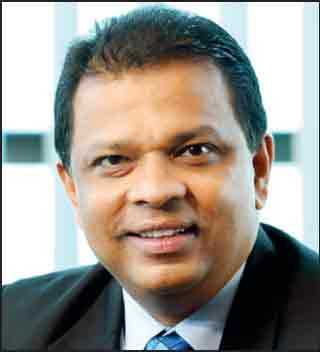Monday Feb 16, 2026
Monday Feb 16, 2026
Thursday, 14 November 2019 00:18 - - {{hitsCtrl.values.hits}}
Hatton National Bank PLC (HNB) posted a Profit After Tax (PAT) of Rs. 8 billion for the nine-month period ended September 2019, while the group recorded a PAT of Rs. 8.7 billion for the same period.
 |
Chairman Dinesh Weerakkody |
 |
Managing Director/CEO Jonathan Alles |
The third quarter of 2019 saw HNB’s profits improving to Rs 3.2 billion compared to the previous quarters while the Group PAT for the quarter was Rs. 3.6 billion.
Sluggish economic growth, exacerbated by the prevailing uncertainty, continued to impact the banking industry and affect demand for credit. The focus on CASA deposits enabled HNB to grow its CASA base to Rs. 270 billion, resulting in an 11% YoY growth in Net Interest Income over the corresponding nine-month period ended September 2018.
The fee income for the nine months contracted marginally compared to the previous year. The decrease in income from trade finance was a key reason as the country saw a slowdown in import volumes during the year mainly due to lower vehicle imports. The low economic activity and the absence of development projects resulted in guarantee and loan fees declining as well.
The rupee, which experienced significant volatility between January and September 2018, saw an above average exchange gain of Rs. 1.8 billion for 2018. With currency movements not being as pronounced during the first nine months of 2019, only Rs. 287 million in net exchange gains were booked.
HNB Chairman Dinesh Weerakkody said: “The economy has been struggling following the unfortunate events of 21 April 2019 which resulted in many industries being negatively impacted directly and indirectly and that includes the financial services sector. However, micro and macro indicators have gradually improved since then, therefore we remain bullish that the economy will gradually regain its lost momentum.”
HNB Managing Director/CEO Jonathan Alles, commenting upon the bank’s performance, stated: “The economy and country is currently at a crucial juncture and we are confident of the future prospects after the Presidential Election. It is imperative that conducive policies are implemented and the Executive and the Legislature work in tandem to ensure the long-term sustainability of our economy.
The interest margins of the sector are under pressure and the stressed market conditions along with the new IFRS 9 Accounting Standard have resulted in higher impairment charges hampering internal capital generation of the sector. Against this backdrop, imposing higher taxes on the banking sector is counterproductive for the development of the nation as the banks will be restricted in on-lending to stimulate economic growth.”
Alles added: “Notwithstanding external conditions, HNB is forging ahead with its ambitious transformational journey to ensure future readiness. While the program is centred round systems, processes and people, ensuring business sustainability has been a key priority.
“The success of the proactive initiatives implemented by the bank is evident by the fact that HNB has been able to contain its NPAs in the last two quarters despite the sector experiencing further deterioration due to prevailing adverse market conditions.”
Total Operating Expenses for the nine-month period up to September 2019 rose by 12.3% YoY to Rs. 18 billion. The bank was successful in maintaining its Cost to Income ratio under 40% as at end of 3Q 2019, enabling it to record an Operating Profit of Rs. 19.3 billion and a Profit Before Taxes (PBT) of Rs. 13.4 billion for the period.
The Rs. 8 billion PAT reflected the total effective tax rate surge from 46.6% in the corresponding period of 2018 to 58.3% for the period ending September 2019 as a result of the introduction of the Debt Repayment Levy (DRL) effective from the last quarter of 2018 as well as the removal of exemptions on the Sri Lanka Development Bond (SLDB) and Debenture investments which were intact during the first quarter of the previous year.
All group companies contributed to group profitability during the nine-month period with Group Operating Profit and PBT amounting to Rs. 20.8 billion and Rs. 14.6 billion respectively. Rs. 12.2 billion was paid as Group taxes as the increase in the total effective tax rate mirrored that of the bank to weigh on Group PAT which was nearly Rs. 8.7 billion.
HNB has been recognised locally and internationally thus far in 2019, being adjudged the ‘Strongest Sri Lankan Bank by Balance Sheet’ by the prestigious Asian Banker Magazine. Euromoney Magazine bestowed upon it the honour of being the ‘Best Bank in Sri Lanka’, an award it won for the third time in the bank’s history.
Earlier in the year, the Asian Banker Magazine recognised HNB as the ‘Best Managed Bank in Sri Lanka’ for its achievements between 2016 and 2018. The bank was also recognised by the Asian Banker as the ‘Best Bank for SME in Sri Lanka’ while Asiamoney awarded HNB as the ‘Best Bank for SME, Trade Finance, Cash Management and Corporate Social Responsibility’. HNB was once again acknowledged as one of the ‘Top 10 Most Admired Companies’ at the second CIMA and ICCSL Most Admired Companies Awards and after a lapse of 22 years HNB was recognised as the main company in Sri Lanka by Business Today.
HNB is the first local bank in Sri Lanka to receive an international rating on par with the Sovereign from Moody’s Investor Services and has a National Long-term rating of AA- (lka) from Fitch Ratings. The bank is also ranked amongst the ‘Top 1000 World banks’ as published by the prestigious Banker Magazine UK, a recognition bestowed upon HNB since 2017.